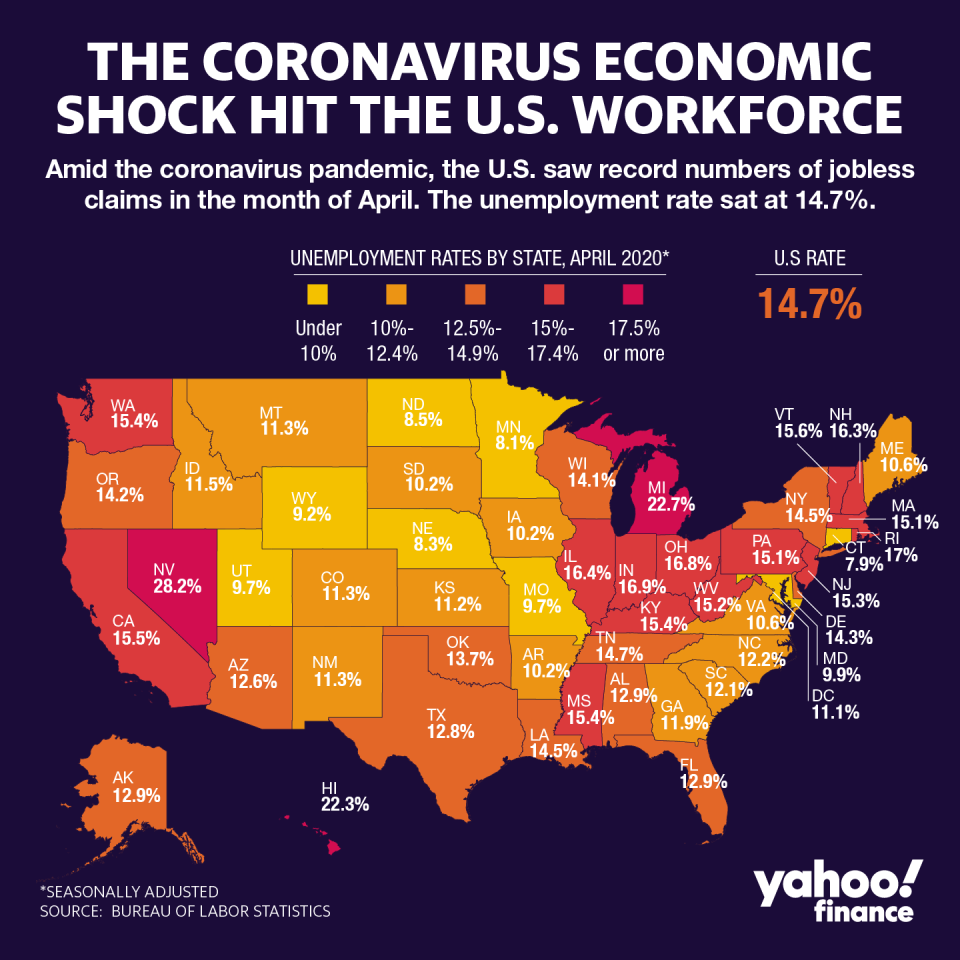The recovery faces two major labor market risks: Morning Brief
Friday, May 29, 2020
Get the Morning Brief sent directly to your inbox every Monday to Friday by 6:30 a.m. ET.
The clock is ticking on benefits and temporary layoffs.
The U.S. labor market has been decimated in two months.
Data released Thursday revealed that some 40 million Americans have filed for unemployment insurance in the last 10 weeks.
And while economists noted Thursday that a decline is continuing unemployment claims suggests some workers are returning to work, the labor market faces significant long-term challenges that could take years to repair.
Jan Hatzius and the economics team at Goldman Sachs explored in a note earlier this week that two big problems specific to the U.S. labor market could have far reaching consequences: furloughs becoming permanent job losses and unemployment benefits falling far short of replacing lost income.
And while both of these concerns don’t take a Ph.D in economics to appreciate, these concerns have so far been somewhat held at bay by policies enacted in the immediate aftermath of the pandemic breaking out in the U.S. But the passage of time will challenge both of these key issues.
“While the vast majority of job losers in the US are on ‘temporary layoff’ for now, the ties with their former employers will likely weaken over time,” Hatzius writes. “This means that more workers will need to find truly new jobs than in a European-style system that relies more on preserving existing employment relationships via wage subsidies.”
First-time unemployment filings still totaling in the millions roughly two months after broad shelter-in-place measures have been enacted nationwide suggests that many of these temporary layoffs are indeed becoming permanent.
“Let me put this really pithily so all the journalists can include a quote of it in their reports,” Upwork chief economist Adam Ozimek tweeted Thursday following the latest initial claims data which showed 2.123 million American filed for unemployment insurance last week.
“That millions are still being laid off this late into the pandemic suggests that the layoffs are increasingly the result of businesses closing permanently rather than temporarily.”
And while Hatzius notes that, in theory, a major recalibration of the U.S. labor market “could have advantages if the post-virus economy looks dramatically different from the pre-virus economy” the practice is likely to yield less attractive outcomes for workers.
“We expect that structural changes will be meaningful only in some industries but much more limited in others,” Hatzius notes. “Moreover, only a portion of the workers that lose their jobs in shrinking sectors will be employable in growing sectors.”
Not everyone, after all, can work from home and not every work-from-home job is in a growing part of the labor market.
Another pressing issue in the U.S. labor market is the looming expiration of enhanced unemployment benefits. The CARES Act passed in late March made an additional $600/week available to folks filing for unemployment insurance. This added benefit has helped workers on the low end of the wage scale replace more than 100% of lost income.

The benefits of this have so far been two-fold.
Most importantly, having income more than replaced by unemployment insurance allows workers to stay home and help stem the spread of COVID-19.
Business contacts in several of the Federal Reserve’s 12 districts noted in the Fed’s Beige Book report on Wednesday that these enhanced unemployment benefits had led to a reluctance among some employees to return to work. And this is, again, the intent of the program. These benefits allow workers to remain home without suffering devastating economic consequences.
But this income replacement for millions of workers has also helped steady the consumer. And in an economy where just under 70% of GDP comes from consumer spending, continuing to aid in a slow-but-steady push higher in spending is essential.
Data from JPMorgan’s economics team shows that consumer spending is now more than 22% above its March 31 low, with these gains evenly spread across geographies and generations. A pullback in spending is expected during an economic shock of this magnitude, but continuing to help along this recovery will be essential as we move through this recession.
Hatzius, however, expects the next stage of this process will ultimately disappoint writing, “In the end, we think a partial extension at $300/week will limit both the incentive effects and the income hit without fully resolving either issue.”
By Myles Udland, reporter and co-anchor of The Final Round. Follow him at @MylesUdland
What to watch today
Economy
8:30 a.m. ET: Wholesale Inventories month-on-month, April preliminary (-0.8% in March)
8:30 a.m. ET: Personal Income, April (-6.8% expected, -2.0% in March)
8:30 a.m. ET: Personal Spending, April (-12.0% expected, -7.5% in March)
9:45 a.m. ET: MNI Chicago PMI, May (40.0 expected, 35.4 in April)
10 a.m. ET: University of Michigan Sentiment, May final (73.7 expected, 73.7 prior)
Top News
Twitter adds 'glorifying violence' warning to Trump tweet [AP]
US-China tensions spark downbeat end to the week for stocks [Yahoo Finance UK]
Salesforce cuts annual sales estimates on COVID-19 hit [Reuters]
Costco Wholesale revenue rises 7.3% on coronavirus-induced stockpiling [Reuters]
Peet’s Coffee, Europe's largest IPO of year, raises $2.5 billion [Bloomberg]
YAHOO FINANCE HIGHLIGHTS
Popeyes US sales are making a massive comeback
Coronavirus job losses are hitting these 3 states the hardest
Mark Cuban proposes 'use it or lose it' debit card as coronavirus stimulus
—
Follow Yahoo Finance on Twitter, Facebook, Instagram, Flipboard, SmartNews, LinkedIn, YouTube, and reddit.
Find live stock market quotes and the latest business and finance news
For tutorials and information on investing and trading stocks, check out Cashay

 Yahoo Finance
Yahoo Finance 
